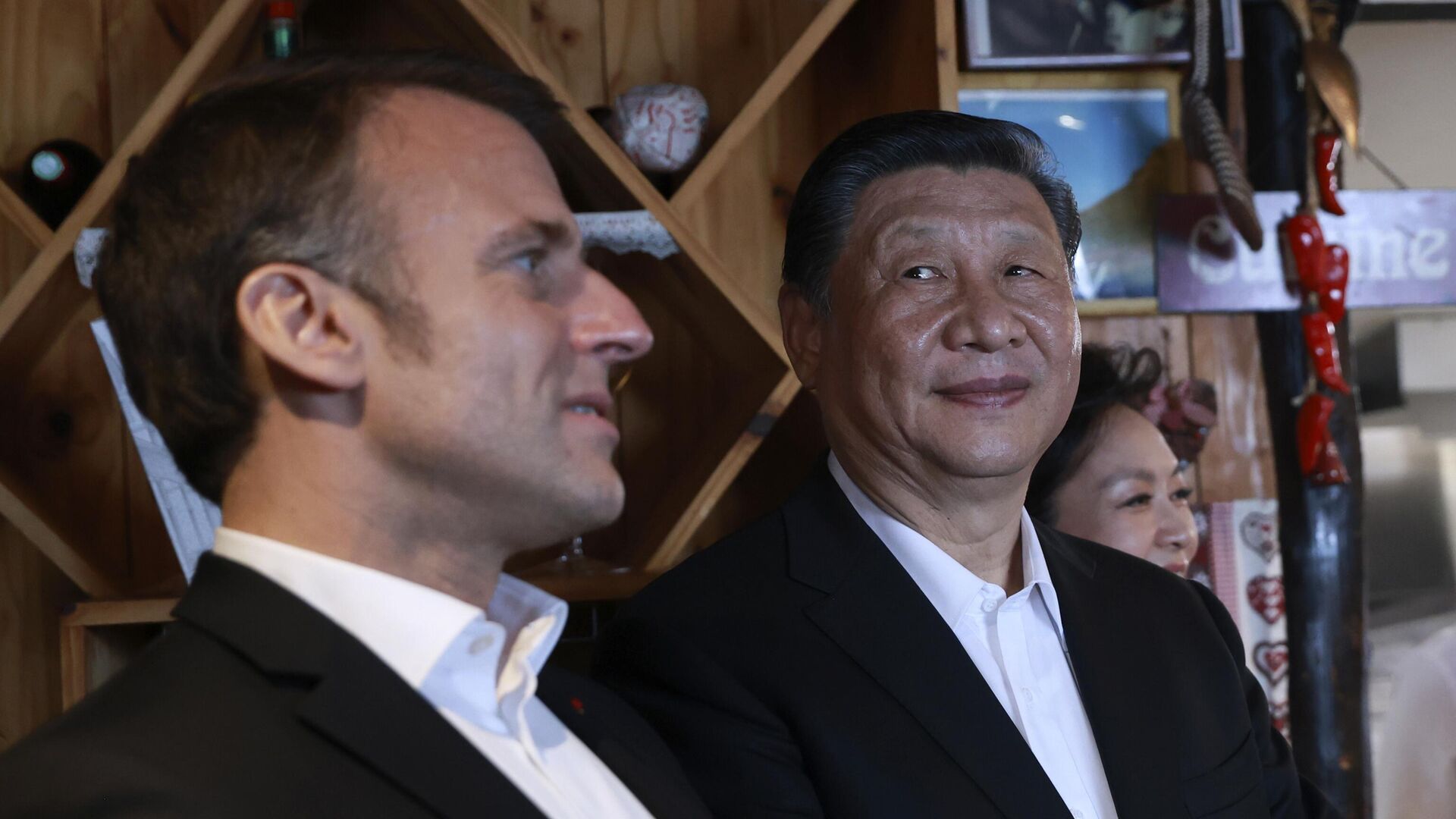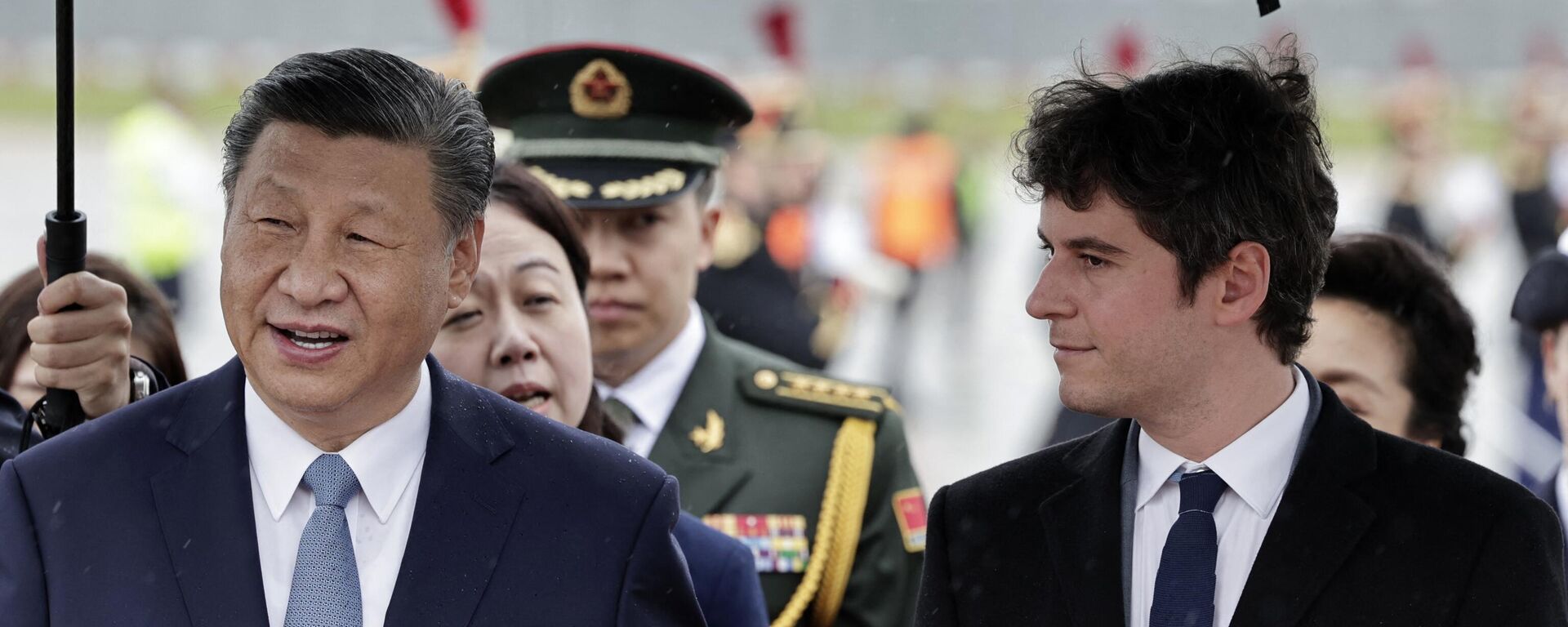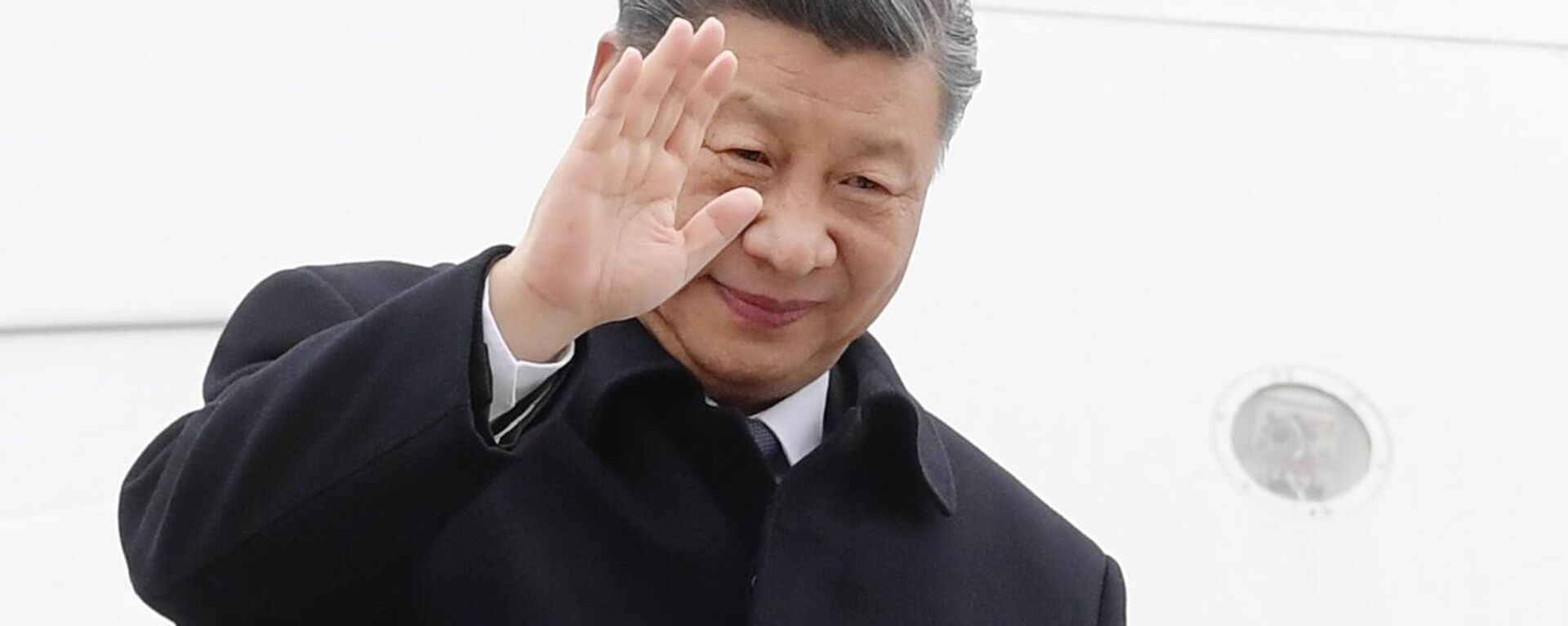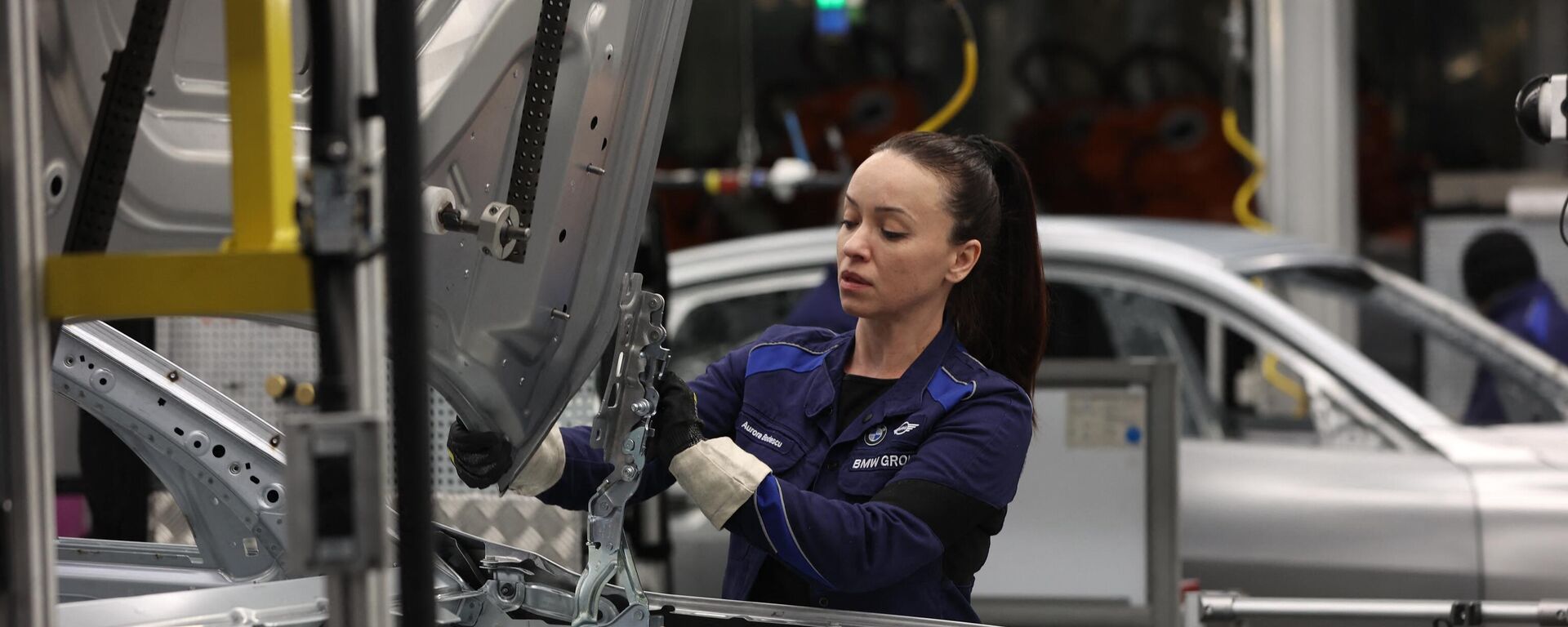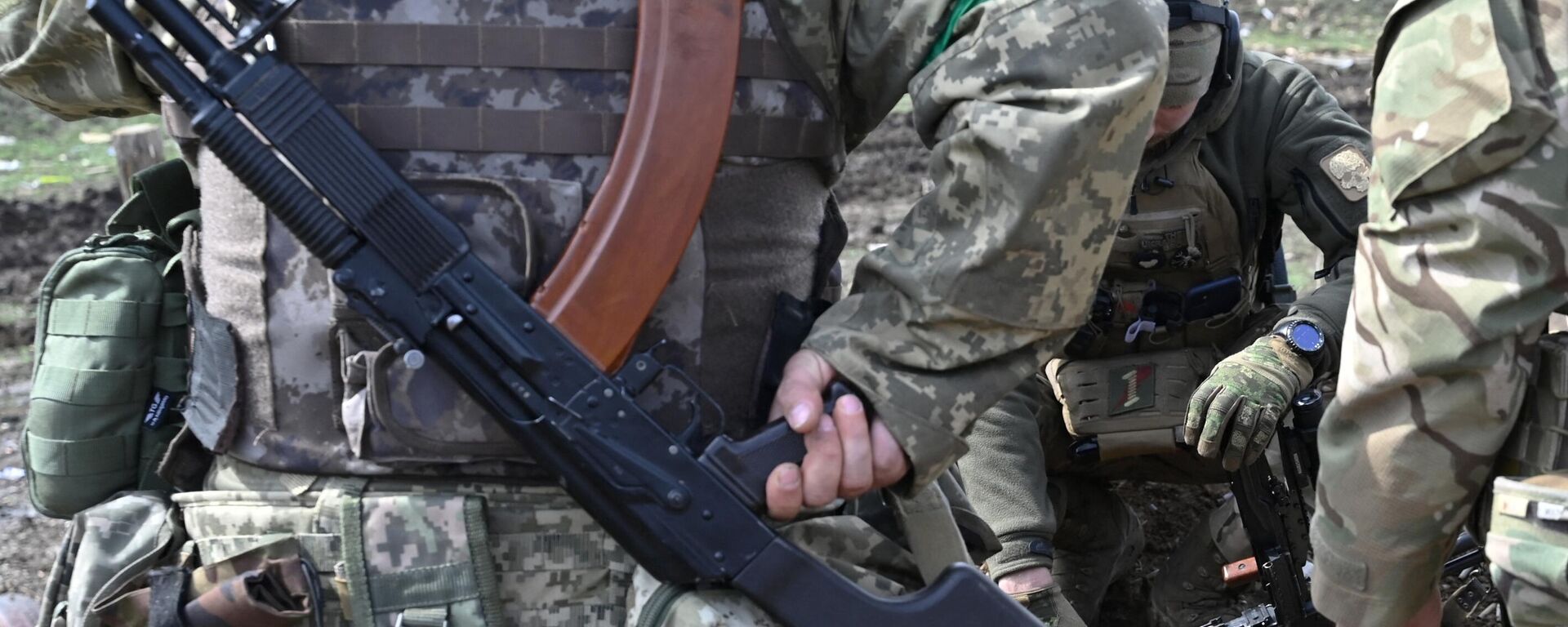https://sputnikglobe.com/20240508/european-leaders-ignore-public-opinion-domestic-concerns-to-stoke-cold-war-1118324246.html
European Leaders Ignore Public Opinion, Domestic Concerns to Stoke Cold War
European Leaders Ignore Public Opinion, Domestic Concerns to Stoke Cold War
Sputnik International
Europe’s economy has faltered amid the West’s obsession with undermining Russia, but leaders seem intent on ignoring public opinion in order to continue ramping up tensions.
2024-05-08T02:07+0000
2024-05-08T02:07+0000
2024-05-08T02:26+0000
analysis
annalena baerbock
george szamuely
olaf scholz
china
russia
ukraine
nato
fault lines
peace
https://cdn1.img.sputnikglobe.com/img/07e8/05/07/1118324464_0:160:3072:1888_1920x0_80_0_0_1a556932d9f3c774f263be179cfe26a4.jpg
President Xi Jinping’s visit to Europe this week marks his first trip to the continent in five years after the global disruption of the COVID-19 pandemic saw the leader largely remain in China.Xi is traveling to three key countries during his visit with historical cultural and geopolitical ties to Beijing. Trade and economic concerns are near the top of the agenda as China takes steps toward investing in infrastructure throughout the continent as part of the country’s Belt and Road Initiative.But many European leaders are far more focused on the West’s proxy war in Ukraine against Russia noted Dr. George Szamuely, a senior research fellow at the Global Policy Institute. Szamuely joined Sputnik’s Fault Lines program Tuesday to discuss the obsession over the conflict among officials in France, Germany, and elsewhere.“There's no question Europe is very heavily dependent on trade with China,” said Szamuely, author of the book Bombs for Peace: NATO's Humanitarian War on Yugoslavia.Tensions have arisen over US claims that Beijing is supplying Russia with “dual use” products able to be used for civilian as well as military purposes. US Secretary of State Antony Blinken sharply criticized China over the issue in recent comments, in line with a pattern of public American condemnation of Beijing immediately following diplomatic encounters.Chinese leaders have rejected the complaint, claiming the country maintains a sovereign right to conduct trade with whomever it desires.Still, officials across the continent have aligned themselves with the Biden administration’s stance on China and Ukraine even when such posturing places them at odds with the will of the public.German Chancellor Olaf Scholz has attempted to maintain good relations with Beijing, noted Szamuely, given the country’s crucial importance as a foreign market for Berlin’s automakers. But the researcher said Scholz’s foreign minister Annalena Baerbock “is rabid on the subject of China, almost as bad as she is on the subject of Russia.”“If she were to take control of policy then Europe would indeed go down the path of sanctioning China and hurting itself,” he said. “Already we've seen… how much Europe has hurt itself through its sanctions policy against Russia. But as Annalena Baerbock has famously said… Ukraine is far more important to me than the wishes of the German people.”Baerbock caused a stir in 2022 when the German minister of foreign affairs explicitly stated she is willing to oppose domestic opinion in order to continue the country’s anti-Russia stance.Szamuely said China is unlikely to change its stance in regards to Russia as a result of European pressure.“China is very unlikely to show up for this meeting, this 'peace conference' that excludes Russia that's supposed to be held in Switzerland,” said the author, referring to a meeting planned for June at the luxurious Bürgenstock resort near Lucerne.“One of the key parties – the key party – isn't invited. So China is not going to go along with something so farcical,” he added, claiming the European ploy would amount to “Russian capitulation.”China unveiled its own 12-point plan for peace in Ukraine in 2023, which Szamuely noted was “ignored” by the US and European Union.Beijing’s plan called for “a balanced, effective and sustainable European security architecture,” also criticizing “unilateral sanctions” and “‘long-arm jurisdiction’ against other countries.”“Dialogue and negotiation are the only viable solution to the Ukraine crisis,” the proposal concluded.
https://sputnikglobe.com/20240506/chinese-president-visits-three-key-countries-during-trip-to-europe-1118281008.html
https://sputnikglobe.com/20240505/xi-plans-to-discuss-china-france-relations-and-important-regional-issues-with-macron-1118276307.html
https://sputnikglobe.com/20240505/german-economy-hit-by-unprecedented-outflow-of-capital--cdu-chairman-1118271912.html
https://sputnikglobe.com/20230430/chinas-ukraine-peace-plan-platform-to-start-process-of-political-settlement-of-ukraine-conflict-1109984415.html
china
russia
ukraine
Sputnik International
feedback@sputniknews.com
+74956456601
MIA „Rossiya Segodnya“
2024
John Miles
https://cdn1.img.sputnikglobe.com/img/07e8/01/19/1116388787_0:0:1316:1316_100x100_80_0_0_77e70d36afd983012b1c5d38ddb84156.jpg
John Miles
https://cdn1.img.sputnikglobe.com/img/07e8/01/19/1116388787_0:0:1316:1316_100x100_80_0_0_77e70d36afd983012b1c5d38ddb84156.jpg
News
en_EN
Sputnik International
feedback@sputniknews.com
+74956456601
MIA „Rossiya Segodnya“
Sputnik International
feedback@sputniknews.com
+74956456601
MIA „Rossiya Segodnya“
John Miles
https://cdn1.img.sputnikglobe.com/img/07e8/01/19/1116388787_0:0:1316:1316_100x100_80_0_0_77e70d36afd983012b1c5d38ddb84156.jpg
europe china russia cold war, china cold war, new cold war, us criticism china trade with russia, xi jinping visit to europe, xi jinping visit to france, europe china relations, euro sino relations, china russia dual use products, china russia trade, china ukraine peace plan, china 12-point peace plan, ukraine crisis, isolation of russia, russia-china alliance, russia-china stance
europe china russia cold war, china cold war, new cold war, us criticism china trade with russia, xi jinping visit to europe, xi jinping visit to france, europe china relations, euro sino relations, china russia dual use products, china russia trade, china ukraine peace plan, china 12-point peace plan, ukraine crisis, isolation of russia, russia-china alliance, russia-china stance
European Leaders Ignore Public Opinion, Domestic Concerns to Stoke Cold War
02:07 GMT 08.05.2024 (Updated: 02:26 GMT 08.05.2024) Europe’s economy has faltered amid the West’s obsession with undermining Russia, but leaders seem intent on ignoring public opinion in order to continue ramping up tensions.
President Xi Jinping’s visit to Europe this week marks his first trip to the continent in five years after the global disruption of the COVID-19 pandemic saw the leader largely remain in China.
Xi is traveling to
three key countries during his visit with historical cultural and geopolitical ties to Beijing. Trade and economic concerns are near the top of the agenda as China takes steps toward investing in infrastructure throughout the continent as part of the country’s Belt and Road Initiative.
But many European leaders are far more focused on the West’s proxy war in Ukraine against Russia noted Dr. George Szamuely, a senior research fellow at the Global Policy Institute. Szamuely joined
Sputnik’s Fault Lines program Tuesday to discuss the obsession over the conflict among officials in France, Germany, and elsewhere.
“There's no question Europe is very heavily dependent on trade with China,” said Szamuely, author of the book Bombs for Peace: NATO's Humanitarian War on Yugoslavia.
“But at the same time Europe is wedded to this policy in Ukraine of seeking the military and strategic defeat of Russia,” he noted. “These policies are somewhat in tension. That's why they've been seeking for more than two years to apply pressure on China… to do what? It's not at all clear because China hasn't really been an ally or a partner of Russia's. China has taken a neutral stance.”
Tensions have arisen over US claims that Beijing is supplying Russia with “dual use” products able to be used for civilian as well as military purposes. US Secretary of State Antony Blinken
sharply criticized China over the issue in recent comments, in line with a pattern of public American condemnation of Beijing immediately following diplomatic encounters.
Chinese leaders have rejected the complaint, claiming the country maintains a sovereign right to conduct trade with whomever it desires.
“Just about anything in the world can be ‘dual use’ for other purposes,” said Szamuely. “So it's an absurd argument… they clearly are not doing anything at all to help any citizens of Europe.”
Still, officials across the continent have aligned themselves with the Biden administration’s stance on China and Ukraine even when such posturing places them at odds with the will of the public.
German Chancellor Olaf Scholz has attempted to maintain good relations with Beijing, noted Szamuely, given the country’s crucial importance as a foreign market for Berlin’s automakers. But the researcher said Scholz’s foreign minister Annalena Baerbock “is rabid on the subject of China, almost as bad as she is on the subject of Russia.”
“If she were to take control of policy then Europe would indeed go down the path of sanctioning China and hurting itself,” he said. “Already we've seen… how much Europe has hurt itself through its sanctions policy against Russia. But as Annalena Baerbock has famously said… Ukraine is far more important to me than the wishes of the German people.”
Baerbock caused a stir in 2022 when the German minister of foreign affairs explicitly
stated she is willing to oppose domestic opinion in order to continue the country’s anti-Russia stance.
“No matter what my German voters think, I want to deliver to the people of Ukraine,” said Baerbock in comments that were widely panned. “We are now facing wintertime, where we will be challenged as democratic politicians… We will stand with Ukraine, and this means that the sanctions will continue on through wintertime, even if it gets really tough for politicians.”
Szamuely said China is unlikely to change its stance in regards to Russia as a result of European pressure.
“China is very unlikely to show up for this meeting, this 'peace conference' that excludes Russia that's supposed to be held in Switzerland,” said the author, referring to a meeting planned for June at the luxurious Bürgenstock resort near Lucerne.
“One of the key parties – the key party – isn't invited. So China is not going to go along with something so farcical,” he added, claiming the European ploy would amount to “Russian capitulation.”
China unveiled its own
12-point plan for peace in Ukraine in 2023, which Szamuely noted was “ignored” by the US and European Union.
China’s plan criticized the eastward expansion of NATO as the origin of the conflict, insisting, “The security of a country should not be pursued at the expense of others. The security of a region should not be achieved by strengthening or expanding military blocs. The legitimate security interests and concerns of all countries must be taken seriously and addressed properly.”
Beijing’s plan called for “a balanced, effective and sustainable European security architecture,” also criticizing “unilateral sanctions” and “‘long-arm jurisdiction’ against other countries.”
“Dialogue and negotiation are the only viable solution to the Ukraine crisis,” the proposal concluded.
